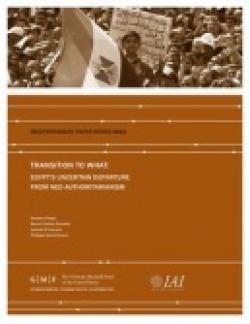Transition to What: Egypt's Uncertain Departure from Neo-authoritarianism
The events of January-February 2011 have opened a new era in Egyptian contemporary history, putting an end to the 30-year long authoritarian rule of president Hosni Mubarak. The new, evolving regime might reasonably be expected to be more pluralistic and allow some more political space compared to Mubarak's time. And yet, the temptation to employ old and deeply rooted formulas of power might be hard to resist, especially because finding new ways to govern implies a radical change in the internal and external balance of power and in the distribution of resources between the rulers and the ruled. That notwithstanding, the mark left on the Egyptian people by the experience of a large and, at least in the short term, successful popular mobilization should not be underestimated. Even in the not unlikely event of a restoration of the regime under the watchful eyes of the military, the people's empowerment may play out in the years to come in unexpected ways.
Papers presented at the IAI-GMF seminar on "Egypt: A Neo-authoritarian State in Troubled Water", Rome, 21 January 2011.
-
Details
Washington, German Marshall Fund of the United States, 2011, 83 p. -
Issue
11
1. Transition to What: Egypt's Uncertain Departure from Neo-authoritarianism, Daniela Pioppi
2. Egypt’s Last Decade: The Emergence of a Social Question, Maria Cristina Paciello
3. The National Democratic Party: The Battleground, Issandr El Amrani
4. Who’s Afraid of the Islamists? An Appraisal of the Muslim Brotherhood’s Health After 40 Years of Co-existence with an Authoritarian Regime, Daniela Pioppi
5. The Sad State of Egypt’s Regional and Foreign Policy, Philippe Droz-Vincent
6. Conclusion: Could Post-Mubarak Egypt Represent a Departure from Neo-authoritarianism?, Daniela Pioppi
Annexes
Topic
Tag
Related content
-
Event04/03/2015
Egypt: a neo-authoritarian state in troubled water
leggi tutto -
Ricerca27/12/2013
Cooperation in the Mediterranean and the Middle East
leggi tutto



